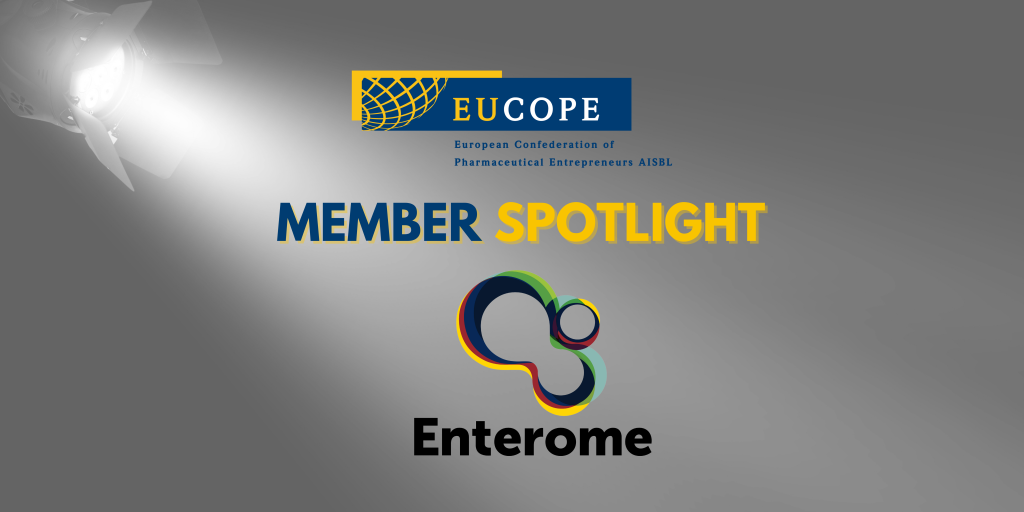Member Spotlight / News - February 20, 2023
EUCOPE Member Spotlight: Q&A with Enterome

Every month, EUCOPE spotlights a member company and the great work they’re doing to advance the life sciences industry and drive innovation to serve patients better. In February, we spoke with Anne Dagallier, Chief Business Officer of Enterome.
 Anne Dagallier joined Enterome in 2021 as Chief Business Officer after 19 years at Sanofi where she held several scientific and senior external innovation and business development positions. Most recently, she was Head of Consumer Health Care Alliances and In-Licenses at Sanofi Global Alliances Management, where she was responsible for managing strategic alliances and in-licensing deals to support Sanofi’s R&D pipeline. Prior to this Anne was Director Business Development for China and Emerging Market and Head of External Innovation for Infectious Diseases. Anne started her career as a researcher at the French National Research Center (CNRS) following postdoctoral research at the Mount Sinai Hospital in New York. Anne holds a PhD in Molecular Biophysics from Sorbonne University Pierre and Marie Curie Campus (University Paris VI) and an Executive MBA from ESSEC-Mannheim.
Anne Dagallier joined Enterome in 2021 as Chief Business Officer after 19 years at Sanofi where she held several scientific and senior external innovation and business development positions. Most recently, she was Head of Consumer Health Care Alliances and In-Licenses at Sanofi Global Alliances Management, where she was responsible for managing strategic alliances and in-licensing deals to support Sanofi’s R&D pipeline. Prior to this Anne was Director Business Development for China and Emerging Market and Head of External Innovation for Infectious Diseases. Anne started her career as a researcher at the French National Research Center (CNRS) following postdoctoral research at the Mount Sinai Hospital in New York. Anne holds a PhD in Molecular Biophysics from Sorbonne University Pierre and Marie Curie Campus (University Paris VI) and an Executive MBA from ESSEC-Mannheim.
Tell us about your organisation and its mission and how you drive innovation internally?
Enterome is a clinical-stage biotechnology company founded in Paris in 2012, We are focused on developing transformational, off-the-shelf cancer immunotherapies targeting solid and liquid tumors based on our unique OncoMimics platform. Ongoing Phase 2 trials for our most advanced program, EO2401, have already shown promising efficacy against hard-to-treat cancers (recurrent glioblastoma and adrenal malignancies) and good safety in more than 130 patients. We also have other clinical studies ongoing and planned with different OncoMimics candidates in a range of tumor types including EO2463 in Non-Hodgkin Lymphomas, EO2040 in ctDNA-defined Minimal Residual Disease in colorectal cancer, and EO4010 for the treatment of patients with unresectable, previously treated, metastatic CRC.
Our OncoMimics approach engages a hitherto untapped part of the immune repertoire that exists in every patient: memory T cells. We induce this powerful immune response using specific peptides secreted by the gut bacteria that mimic tumor associated antigens (TAAs) and redirect it against the tumor cells. This unique mode of action allows us to overcome the immune tolerance to TAAs, which are recognised as self-antigens, and that severely limit the effectiveness of existing immunotherapies.
Findings from several studies, including preliminary data from our clinical trials presented in 2022 at several leading international clinical congresses, show that our OncoMimics™ generate a powerful and long-lasting immune response, associated with tumor shrinkage and that appears to correlate with improved survival. Our ambition is to help more patients beat cancer by extending the promise of immunotherapy through this novel mechanism.
Furthermore, constant innovation based on Enterome’s unrivalled knowledge of the immunomodulatory functions of peptides derived from gut bacteria is key to our ability to create next-generation products designed to treat multiple immune diseases such as cancer, as well as auto-immune disorders.
How do your organisation’s activities help patients now and into the future?
Our dedication to improving the therapeutic options available to cancer patients drives everything we do, every day at Enterome. We believe that both innovation and collaboration are vital to continuing the progress made so far.
We are fortunate to have support from world-leading cancer institutions both in Europe and in the US. The dedication of the talented clinicians who are evaluating our pipeline of immunotherapies in clinical trials is invaluable to us.
We also undertake to collaborate with patient associations to keep them informed of the progress we are making and ensure we are aware of the most pressing needs. Together, we are determined to develop cancer treatments that deliver improved therapeutic benefits to patients, especially to those not responding to existing therapies.
What do you see as the biggest challenge facing the life sciences industry today?
Since the launch of the first checkpoint inhibitor in 2011, the use of immunotherapies has grown considerably – but remains far from routine. As their clinical benefits have been demonstrated mainly in advanced metastatic cancers, immunotherapies are still perceived as a last resort. And unfortunately, the response rate remains low (around 20% in melanoma) with little possibility to predict who will benefit.
Optimizing the clinical benefits and increasing the number of patients who respond remain key challenges to fulfilling the promise of immunotherapy. Contrary to personalised medicine that targets a limited number of patients or checkpoint inhibitors where the response rate remains low our aim at Enterome is to bring therapeutic solutions that address a larger population of patients including those with solid or liquid tumor types, and also those that are immunologically “cold” as well as “hot.”
In addition, our product candidates are composed of short, synthetic peptides that follow standard manufacturing and regulatory pathways and could offer a very favourable pharmacoeconomic profile.
What are the major health policy issues and themes that you are most focused on in 2023?
We are paying particular attention to the Clinical Trials Regulation that now applies in Europe. This legislation is designed to prevent additional delays to the development of new therapies and also to encourage patients to participate in clinical trials.
Improving patient access to healthcare and defending European sovereignty in the industry requires government support to provide the right framework to advance technologies as well as readily available financing solutions for companies developing novel approaches.
Finally, rewarding innovation in healthcare remains a crucial issue, particularly in ultra-rare indications. For example, Enterome is developing EO2401 in adrenocortical carcinoma (ACC), a disease that affects only a few hundred patients per year in Europe. Biotech companies need to be confident that they will be able to generate an appropriate economic return for their efforts in such rare diseases.
What attracted you to join EUCOPE and how can we help you achieve your business goals?
We recently became a member of EUCOPE as we wanted to find the right organisation to represent small-size companies like Enterome at the EU level as well as have the possibility to join working groups and have an impact, through EUCOPE, on upcoming EU legislative framework.
Being represented and having a chance to impact the upcoming legislation on major topics such as EU Pharmaceutical and HTA legislations as well as the revision of the OMP regulation is of primary importance for companies like Enterome which are developing medicinal products to treat rare diseases. Finally, we are convinced that exchanging with other companies on these major topics could bring added value to our business.
For more information about EUCOPE membership
Visit our Benefits of Membership Page, or schedule an introductory call with our Business Development Manager Dante Di Iulio diiulio@eucope.org
